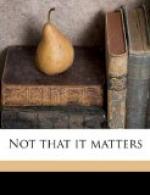Consider what it is to be bad at lawn tennis. True, you are allowed to hold on to your new racket all through the game, but how often are you allowed to employ it usefully? How often does your partner cry “Mine!” and bundle you out of the way? Is there pleasure in playing football badly? You may spend the full eighty minutes in your new boots, but your relations with the ball will be distant. They do not give you a ball to yourself at football.
But how different a game is golf. At golf it is the bad player who gets the most strokes. However good his opponent, the bad player has the right to play out each hole to the end; he will get more than his share of the game. He need have no fears that his new driver will not be employed. He will have as many swings with it as the scratch man; more, if he misses the ball altogether upon one or two tees. If he buys a new niblick he is certain to get fun out of it on the very first day.
And, above all, there is this to be said for golfing mediocrity— the bad player can make the strokes of the good player. The poor cricketer has perhaps never made fifty in his life; as soon as he stands at the wickets he knows that he is not going to make fifty to-day. But the eighteen-handicap man has some time or other played every hole on the course to perfection. He has driven a ball 250 yards; he has made superb approaches; he has run down the long putt. Any of these things may suddenly happen to him again. And therefore it is not his fate to have to sit in the club smoking- room after his second round and listen to the wonderful deeds of others. He can join in too. He can say with perfect truth, “I once carried the ditch at the fourth with my second,” or “I remember when I drove into the bunker guarding the eighth green,” or even “I did a three at the eleventh this afternoon”—bogey being five. But if the bad cricketer says, “I remember when I took a century in forty minutes off Lockwood and Richardson,” he is nothing but a liar.
For these and other reasons golf is the best game in the world for the bad player. And sometimes I am tempted to go further and say that it is a better game for the bad player than for the good player. The joy of driving a ball straight after a week of slicing, the joy of putting a mashie shot dead, the joy of even a moderate stroke with a brassie; best of all, the joy of the perfect cleek shot—these things the good player will never know. Every stroke we bad players make we make in hope. It is never so bad but it might have been worse; it is never so bad but we are confident of doing better next time. And if the next stroke is good, what happiness fills our soul. How eagerly we tell ourselves that in a little while all our strokes will be as good.
What does Vardon know of this? If he does a five hole in four he blames himself that he did not do it in three; if he does it in five he is miserable. He will never experience that happy surprise with which we hail our best strokes. Only his bad strokes surprise him, and then we may suppose that he is not happy. His length and accuracy are mechanical; they are not the result, as so often in our case, of some suddenly applied maxim or some suddenly discovered innovation. The only thing which can vary in his game is his putting, and putting is not golf but croquet.




